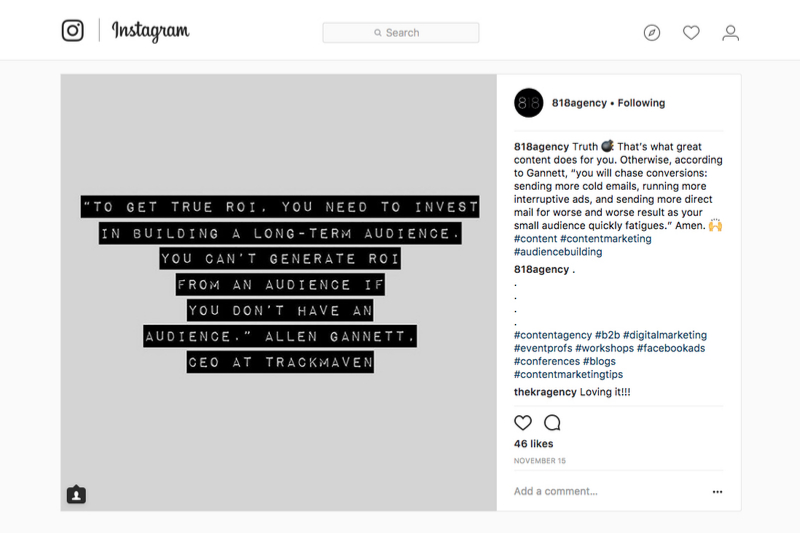It’s official. We’ve entered a new era of strategic consulting, content-based education, and digital-based lead generation that requires a very special skill set. In fact, we’re in a storytelling renaissance.
These are the execs and teams who know how to create and develop clear narratives while expertly pondering, re-pondering, and solving questions related to the technological applications of our storytelling craft.
The Writer-Technologist, a.k.a. “WT,” is exquisitely good at marrying story to data in order to create clean narrative lines that are the way forward for your campaigns, content, leads, messaging, ROI — and pretty much everything else related to getting customers today.
And 2018 business and marketing trends dictate that everyone on your team needs to be one.
Here’s why.
Today’s CEOs Are looking for writers.
It’s no longer optional for CEOs or clients to hire anyone who doesn’t have exceptional writing skills. In fact, Matt Mullenweg, the creator of WordPress, which powers 29% of all sites on the web(!), said in a recent Inc. interview:
“Skill in writing is one of the things I look for the most in hiring because I feel that clear writing represents clear thinking, regardless of someone’s background, or whether they’re a designer or coder or whatever.”
Editor-Technologists…
1. Are unafraid of being uncertain (at first).
Take it from author and poet Nick Laird (who also happens to be Zadie Smith’s husband):
“The first draft of anything is shit. (Not necessarily true for poetry, which often finds its germination in the initial phrasing itself, but true – at least for me – for fiction.)”
WTs know you can never just “set it and forget it”; there are always more versions and more testing to come.
Eventually, the dots will connect if you sit with them long enough. And continually test, revise, optimize, and enhance. WTs know this.
2. Recognize patterns better than anyone and can synthesize large amounts of information and/or data (mostly without freaking out).
WTs are obsessed with trends, or, as we call them, the little dots in the ether that coalesce for us into articles, posts, products, strategy, or ways to use a platform that few people have thought of before. They recognize patterns and looooove research — not only in data, but also in technology, culture, commerce, products, audiences, and social media.
And they can embed this knowledge inside an organization, turning underperforming campaigns into cash cows (or “kales” if you’re #vegan).
3. Can cognitively order and clearly explain technical things.
WTs know that their most important job is to make complicated things as accessible and as easy-to-understand (and to use) as possible.
“The discipline of writing has helped me frame complicated technical issues for C-level executives and capture their imagination simply by being a better data-storyteller.”
– Adam Nathan, founder of The Bartlett System, which trains CEOs on data strategy and implementation; he is also the author of several well-received memoirs.
4. Are great at sales (i.e. they know how to build long-term audiences to achieve true ROI).
Allen Gannett, CEO of marketing analytics and attribution software company TrackMaven, said what is possibly the quotation of the year:
“To get true ROI, you need to invest in building a long-term audience. You can’t generate ROI from an audience if you don’t have an audience. Otherwise, you will chase conversions: sending more cold emails, running more interruptive ads, and sending more direct mail for worse and worse result as your small audience quickly fatigues.”
WTs know how to create and distribute content like webinars, e-books, workshops, online education, training videos, and downloads that build long-term audiences. WTs are also keenly aware of how to fend off audience fatigue.
In order to get a sale or a “conversion,” you have to think like a storyteller. WTs know that your potential customers will “kick the tires” before contacting you. In fact, 47% of B2B buyers consume 3-5 pieces of content prior to engaging with a salesperson” (Demand Gen).
In a recent Unbounce blog post, Graeme Keeton wrote, “For more meaningful landing page copy, think like a fiction writer,”
Nice one, Graeme.
5. Really think about things and document them (which just so happens to be the key to effective content marketing).
In almost every survey conducted by the Content Marketing Institute, the #1 key to success is actually documenting your content strategy. In other words, great marketers Write. It. Down.
Don DeLillo, acclaimed author, National Book Award winner (White Noise), and copywriter for Ogilvy & Mather(!), famously said:
“Writing is a concentrated form of thinking. I don’t know what I think about certain subjects, even today, until I sit down and try to write about them.”
– Don Delillo in The Paris Review.
6. Are attuned to ROI and CPA calculations but aren’t ruled by them.
Great WTs look at two key metrics when it comes to content:
- Is this a quality, cared-for piece of content clear, vibrant, and educational? Does it succeed without sacrificing its soul for SEO?
- Is it contributing to lowering my cost-per-lead or CPA over time?
Speaking of ROI, WTs also are keenly aware of the “hidden” content marketing costs and the essential tools that turn words into data magic.
They also know how to build thoughtful funnels and nurture leads through them.
7. Know high-quality social media content and ads now require high-quality writing.
Social media ads, Instagram stories, mobile-responsive landing pages. These are no longer a trifle (were they ever?) – and require savvy journalistic, storytelling minds.
As demand for quality social content and ads continues to rise, you need to have a team of WTs in place to meet that — especially across the truncated digital spaces we’re now all obsessed with.
Hovering over all of this, of course, is how every business should approach the analog-meets-digital experience. WTs are already on it.
8. Can spot the difference between messaging and storytelling.
Messaging is different than Storytelling. Messaging will get you a clicks or opens; storytelling will get you a paying customer. For life.
“A writer rearranges life, shortens time intervals, sharpens events, and devises beginnings, middles, and ends.”
– John Steinbeck, as quoted in Steinbeck: Life in Letters.
9. Know when to take a step back and take a break.
This pretty much speaks for itself:
Phillip Meyer, author of the novel “The Son” — now a series on AMC — had this to say:
“You have to be very careful about to what (and to whom) you’re giving the best part of your day. You have to treat your mind the way an athlete treats her body; I’m always taking stock of my mental fitness, my creative battery, and my psychological state; you have to always be pushing yourself, always taking risks, but the recovery time is equally important. Sometimes the well is empty; sometimes you’re in such a bad mood that everything you write looks terrible. But in the end, your mind really does get stronger with cycles of effort and recovery, and so my days, months and years revolve around these cycles.” (From The NY Times.)
10. Bring it all together.
One of the things I’m most proud of is that our entire team — right down to the hardcore data, analytics, and technology folks — could have easily been established writers if they wanted to (some already are).
Writer-technologists are we.
Credit for featured image
Photo by Calum MacAulay on Unsplash






